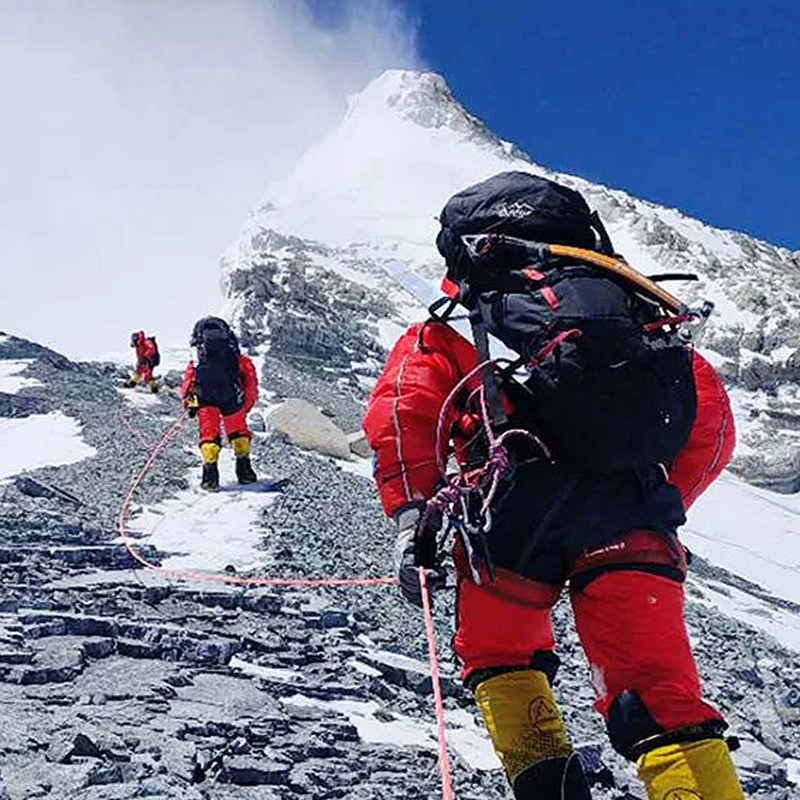This book isn't designed to be a definitive guide to writing, publishing and distribution. If you want to do a deep-dive on those topics, there are millions of chunky books out there. By doing some simple searches, you can find brilliant advice from expert YouTube channels. Beyond that, you'll find plenty of writing courses and writer groups that cover the tradecraft of writing a book perfectly. Presenting you with more of the same information would be a complete waste of your time. So, I won't do that.
Instead, this book will focus on the crucial mistakes you can make when writing your FIRST book. Uncluttered. In as few words as possible.
Enjoy some samples of my writing from the book.

'It is not the mountain we conquer, but ourselves.'
- Sir Edmund Hillary
Thousands of people have climbed Mount Everest over the years.
They all have two things in common: First, they have a burning desire to get to the summit. Second, they have amazing mountaineering skills.
Nobody just turns up at the bottom of the mountain, like a tourist on a day trip, and decides, 'hey, I'm going to climb that today.'
Climbing the mountain takes planning.
At Everest, you'll start on flat ground at Base-Camp, at the foot of the Kumbhu Icefall. Nice and easy. At 6,000 metres you'll reach Camp 1, where you'll stop for a while to a acclimatise. Just above that sits Camp 2, where you'll rest and prepare for the rest of the climb. The climb turns difficult after Camp 3 on the Lohtse Face. This is where you will start to use ropes to scale the steep and dangerous ice slopes. The final Camp sits at 8000 metres. It's called the South Col. From here, you'll make your push to the summit.
To echo the words of Sir Edmund Hillary, you'll need to pass a series of physical and mental camps on your journey to write and publish your first book. You'll come close to giving up at some of the hardest stages, but when you reach the summit, you'll be holding the first copy of your book in your hands. Feeling on top of the world.
Let's get a feel for the mountain.
Before we start, I'll use a mountaineering analogy to give you a feeling for the overall process, from start to finish. I'll compare the stages of finishing your first book to the stages and staging camps you'll encounter climbing a mountain.
This chapter will give you a big-picture view of the complete journey before you start climbing.

'One has to start with years of practice with shorter stories until "climbing" Mt. Everest.'
- George R.R. Martin.
When I started writing, I decided not to write my epic bushranger book first.
I wanted to give my big kahuna the best shot possible. I wasn't a skilled writer and knew little about the book market. Little money was available for luxuries like paid developmental editing during the writing of my first draft.
I didn't want to risk screwing that story up by learning-on-the-go. I wrote a shorter, simpler story first.
I explained to friends I was "writing a book to learn how to write a book."
This would let me put a toe in the publishing water by doing a small, simple publishing project, from end to end. I'd climb a small mountain first. From ground to summit.
I'd use that first book to make sure I was match-fit to write the second one.

In my first book, I made two major mistakes I had to pick apart and rebuild later on.
The first was that my original storyline shifted around in time a lot, going back and forth between the past, the future, and the current day.
I did it that way because I didn't think the story could be told in any other way. After finishing the first outline and getting some feedback from people that had read it, I realised that it just created a level of confusion. I was on the horns of a dilemma because I thought it would be impossible to write the story in a purely linear format (so the times and places were easier to keep track of).
I'd convinced myself that it was a mistake I would just have to live with. I was wrong.
The second was that I wrote the book in US English rather than British English.
My logic was that America would be the biggest market for a book like this. Writing it in US English would make it easier to read. In retrospect, this actually made no sense because it was an Australian story, set in Australia, with Australian characters. Stupid me.
It led to weeks of frustration in the editing process. I won't make that mistake again in my next book.
This site was created with the Nicepage
